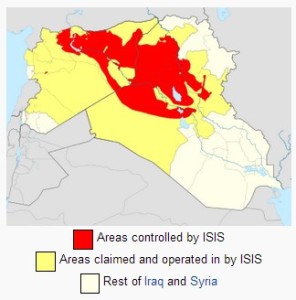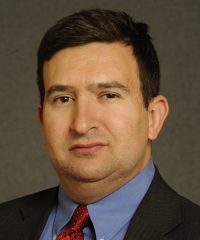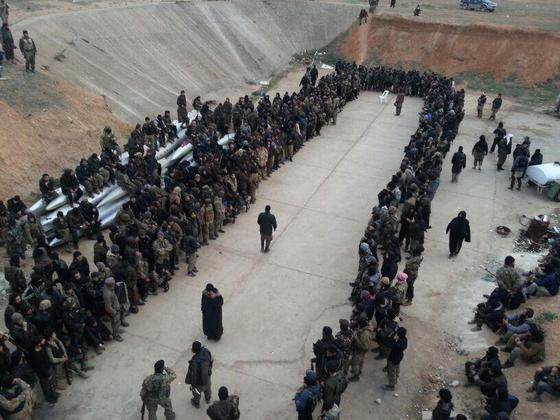The breakaway faction of al Qaeda ISIS, which disobeyed al Qaeda orders–and flouted it–while another branch of al Qaeda in the area, Ahrar a-Sham, was towing the al Qaeda line of building popular support in Syria and waging a
 more effective insurgency–captured large sections of Iraq in the first half of June with a grossly underestimated force. In this article, a fascinating retrospective take on ISIS from February of this year gives us a look on how al Qaeda and terrorist experts viewed ISIS before the attacks–as “a test case” of what would actually happen when a significant al Qaeda affiliate group broke loose from the core.
more effective insurgency–captured large sections of Iraq in the first half of June with a grossly underestimated force. In this article, a fascinating retrospective take on ISIS from February of this year gives us a look on how al Qaeda and terrorist experts viewed ISIS before the attacks–as “a test case” of what would actually happen when a significant al Qaeda affiliate group broke loose from the core.

Counter-terrorism scholar and analyst Daveed Gartenstein-Ross commented on the then-recent rebellion of ISIS in February of this year.
“You’ve certainly had infighting before. Algeria and that civil war is a good example of where you had significant splits in terms of the approach to that conflict. But in terms of this specific event, the degree to which it has happened, I would say is not precedented. It presents a very interesting situation.
“I think this presents the possibility of either fragmentation or else a strong cautionary tale to other affiliates. With respect to fragmentation, the reason why ISIS was expelled from al Qaeda is because they were basically openly flouting the central commands orders. There was infighting that was occuring within Syria and Zawahari had ordered ISIS to take part in mediation with other Jihadist groups including Jabat al Nusura. And ISIS was making a lot of noise about complying, but in fact they weren’t doing it. And so the order that came down on Sunday expelling ISIS was a rather shocking one in the world of Jihadism, which has sent immediate shock waves through that world.
“So if ISIS thrives, despite the fact that it was expelled from al Qaeda, this could, number one, make other organizations, other affiliates, say, ‘Well, what is the cost to me if I disobey senior leadership?’ Number two, they could attract some funding from traditional al Qaeda donors. Number three, you can already see on Jihadist message boards some kind of tensions that have been caused, where some members of these message boards and some Jihadists on Twitter and elsewhere are falling in with ISIS as opposed to al Qaeda.
“On the other hand, what you may have happening is ISIS being the one that fragments rather than al Qaeda. And you can already see some signs of this. For example, Abdullah al Massini, a prominent Saudi cleric who is pro-Jihadist, has called on ISIS fighters to defect. you have reports of some defections from ISIS. You may see serious fragmentation within it with splinter-groups that consider themselves loyal to al Qaeda’s core, as opposed to Abu Bakr al-Baghdadi, who is the leader of ISIS.
“So there are very interesting things that are going to emerge from this,” Gartenstein-Ross continued, referring to mechanisms of command and control. “I think actually this is a very fascinating test case where we’ll actually start to see those mechanisms of control… but you can already see multiple clerics coming down and condemning ISIS. You might see some of their funding dry up. I don’t think you’ll see this immediately, but it actually really is a test-case because because at this point it has sent… an absolute shockwave through Jihadism and one that is going to change the dynamics in one direction or another.”
Daveed Gartenstein-Ross recently published a new article on ISIS, “Welcome to the era of ISIS – and pop-up terror,” in which he wrote, “We’ve seen it all before, but it remains shocking — and the latest advance by the Islamic State of Iraq and al-Sham (ISIS) is arguably the most disturbing development in Iraq’s already horrifying recent history.” Gartenstein-Ross asked in the article, “How long can the group sustain these gains?”
“An examination of what might follow the jihadist groups’ inevitable setbacks shows a disturbing trend,” wrote Gartenstein-Ross. “ISIS is far from the only Islamic extremist movement to control territory and implement a strict version of sharia. Looking at groups that have done so, a clear pattern emerges in which the extremist group gains ground, announces the imposition of sharia, and governs territory. This alarms nearby states, and often those that are further away as well.
“So the extremist group’s enemies strike. They topple it from power rather quickly. Although non-state militants are formidable, they have no real response to their enemies’ air-power advantage, and haven’t been able to hold territory against the advance of professional militaries. The extremist group does its best to melt away rather than face a decisive battlefield defeat. It regroups with the intention of coming back stronger than before.
“The disturbing thing is the frequency with which militant groups are able to succeed in mounting this comeback.” Gartenstein-Ross listed several examples, including the Afghan-Soviet war and the Taliban which came to control 90 percent of Afghanistan. “After 13 years of costly war in Afghanistan, it’s now widely believed that the Taleban will remain one of the country’s most important players, and it is poised to retake territory in various regions.
“Today this pattern–of a militant group’s seizure of territory, followed by a state-led counteroffensive, and militants’ efforts to regroup–is repeating itself in several places.” Gartenstein-Ross referenced Southern Somalia, Nairobi, Kenya, Mali, Yemen, Egypt’s Sinai and the Caucasus region.
Gartenstein-Ross concluded that “though ISIS might succeed in holding a handful of cities for an extended period, it is likely to experience a reversal of some sort,” but, “If recent history is any guide, ISIS’s retreat will not mean the group’s death, and we may well see another cycle of retreat-regroup-new offensive.”
Gartenstein-Ross advised Western countries and their regional partners to work together to prevent extremist groups such as ISIS from establishing long-lasting control. “But they also need to recognise this growing boom-and-bust pattern of instability, and work to address it. Not claiming victory too soon might be a start.”
Day Blakely Donaldson
